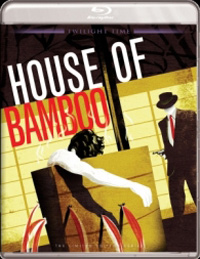 Twilight Time brings Sam Fuller’s exotic 1955 color noir House of Bamboo to Blu-ray, a resplendently colorful film and the first major US production to film in post-war Japan. While Fuller re-tooled Harry Kleiner’s script for the 1948 film The Street with No Name to meet his own offbeat needs, the film experienced a rather cool reception, garnering praise for Joseph MacDonald’s cinematography (and has since been hailed by sources as some of the best uses of widescreen photography in the history of cinema) but little else. Following on the heels of successful black and white titles like Hell and High Water (1954) and the acclaimed film noir Pickup on South Street (1953), it’s a harder title to classify, featuring Fuller’s usual signature of off-balance touches in a production that now seems ahead of its time (especially compared to something like 1964’s black and white provocation The Naked Kiss).
Twilight Time brings Sam Fuller’s exotic 1955 color noir House of Bamboo to Blu-ray, a resplendently colorful film and the first major US production to film in post-war Japan. While Fuller re-tooled Harry Kleiner’s script for the 1948 film The Street with No Name to meet his own offbeat needs, the film experienced a rather cool reception, garnering praise for Joseph MacDonald’s cinematography (and has since been hailed by sources as some of the best uses of widescreen photography in the history of cinema) but little else. Following on the heels of successful black and white titles like Hell and High Water (1954) and the acclaimed film noir Pickup on South Street (1953), it’s a harder title to classify, featuring Fuller’s usual signature of off-balance touches in a production that now seems ahead of its time (especially compared to something like 1964’s black and white provocation The Naked Kiss).
A military supply train guarded by American soldiers and Japanese police going from Kyoto to Tokyo is hijacked and an American sergeant is killed while the murderers make off with the loot of guns and ammo. The Americans and Japanese work together to solve the crime, and get their first lead when a thief, Webber (Biff Elliott) is shot and killed with the stolen bullets. Authorities discover he had been secretly married to a Japanese woman, Mariko (Shirley Yamaguchi). Also in his belongings they discover a letter from an old friend, Eddie (Robert Stack), who arrives in Tokyo to look into the death of his friend with the assistance of his secret wife. It turns out Webber was involved with a crime syndicate run by Sandy Dawson (Robert Ryan), and Eddie uses Mariko as his ‘kimono girl’ to wheedle his way into the syndicate and take Sandy’s group down. But is Eddie even who he really says he is?
Though containing its fair share of twists and turns, the boiled down narrative is a basic skeleton out of the film noir closet. But as dressed by Fuller, it’s much more of a wild creature, earning rightful comparisons to the candy coated confections of Sirk’s soapy melodramas as it addresses the divided landscape of post-WWII Japan, and how the country’s superficial progression clashed dangerously with resentment on social issues, such as interracial romance. And so Fuller utilizes Mariko as the bearded apex between a much more passionate and understated love interest between Robert Ryan and Robert Stack, both involved in shocking moments of violence against her, a woman who basically just wants justice for the death of her husband.
We learn very early on that it’s Sandy’s rule of thumb to kill off his wounded men before they can blab to the police, which happened to Webber and is a truth Mariko is forced into listening to first hand. And yet, the process of Eddie’s nabbing Sandy is always delayed—likewise the savvy criminal’s inability to recognize Eddie as an imposter due to how he feels about him. A stew of bitter emotions rises up in Sandy’s previous ‘right hand’ man, Griff (Cameron Mitchell, a familiar character actor who starred in How to Marry a Millionaire, 1953), resulting in tragedy and a further delay of truth Sandy has no wish to see. As usual, it’s Fuller’s peculiar character dynamics resulting in uncustomarily upsetting or surprising results, with Mariko a tragic figure rejected by her own culture thanks to her involvement with the white foreigners, while two men use her as pawn to get closer to one another.
Disc Review:
Twilight Time’s transfer, in 2.55:1 high definition, looks beautiful. Filmed entirely on location in Tokyo and Yokohama, it’s an incredibly striking piece of filmmaking. Though arguably formulaic, the grand finale, filmed atop an amusement park ride as Ryan eludes the authorities, looks absolutely amazing. Twilight Time includes optional audio commentary from film historians Julie Kirgo and Nick Redman, as well as another optional audio commentary track from film historians Alan Silver and James Ursini.
Fox Movietone News Reel:
Several minutes of newsreel footage of cast and crew landing in Japan is included as well as the Consul visits the set—these moments are without sound, however.
Final Thoughts:
Distinctive auteur Sam Fuller fashioned an impressive filmography with his outré offerings, and House of Bamboo is definitely one of his most gorgeous to behold.
Film Review: ★★★½/☆☆☆☆☆
Disc Review: ★★★½/☆☆☆☆☆


